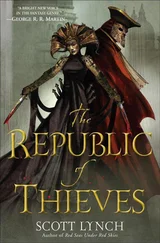City watchmen in their mustard-yellow tabards commanded sleek black cutters-each rowed by a dozen shackled prisoners from the Palace of Patience-using long poles and harsh language to maintain several rough channels through the drifting chaos of the market. Through these channels passed the pleasure barges of the nobility, and heavily laden freight barges, and empty ones like that containing the three Gentlemen Bastards, who shopped with their eyes as they sliced through a sea of hope and avarice.
In just a few lengths of Bug’s poling, they passed a family of trinket dealers in ill-kept brown cockleshells, a spice merchant with his wares on a triangular rack in the middle of an awkward circular raft of the sort called a vertola , and a Canal Tree bobbing and swaying on the leather-bladder pontoon raft that supported its roots. These roots trailed in the water, drinking up the piss and effluvia of the busy city; the canopy of rustling emerald leaves cast thousands of punctuated shadows down on the Gentlemen Bastards as they passed, along with the perfume of citrus. The tree (an alchemical hybrid that grew both limes and lemons) was tended by a middle-aged woman and three small children, who scuttled around in the branches throwing down fruit in response to orders from passing boats.
Above the watercraft of the Shifting Market rose a field of flags and pennants and billowing silk standards, all competing through gaudy colors and symbols to impress their messages on watchful buyers. There were flags adorned with the crude outlines of fish or fowl or both; flags adorned with ale mugs and wine bottles and loaves of bread, boots and trousers and threaded tailors’ needles, fruits and kitchen instruments and carpenters’ tools and a hundred other goods and services. Here and there, small clusters of chicken-flagged boats or shoe-flagged rafts were locked in close combat, their owners loudly proclaiming the superiority of their respective goods or inferring the bastardy of one another’s children, while the watch-boats stood off at a mindful distance, in case anyone should sink or commence a boarding action.
“It’s a pain sometimes, this pretending to be poor.” Locke gazed around in reverie, the sort Bug would have been indulging in if the boy hadn’t been concentrating on avoiding collision. A barge packed with dozens of yowling housecats in wooden slat cages cut their wake, flagged with a blue pennant on which an artfully rendered dead mouse bled rich scarlet threads through a gaping hole in its throat. “There’s just something about this place. I could almost convince myself that I really did have a pressing need for a pound of fish, some bowstrings, old shoes, and a new shovel.”
“Fortunately for our credibility,” said Jean, “we’re coming up on the next major landmark on our way to a fat pile of Don Salvara’s money.” He pointed past the northeastern breakwater of the market, beyond which a row of prosperous-looking waterfront inns and taverns stood between the market and the Temple District.
“Right as always, Jean. Greed before imagination. Keep us on track.” Locke added an enthusiastic but superfluous finger to the direction Jean was already pointing. “Bug! Get us out onto the river, then veer right. One of the twins is going to be waiting for us at the Tumblehome, third inn down on the south bank.”
Bug pushed them north, straining to reach the bottom of the market’s basin-which was easily half again as deep as the surrounding canals-with each thrust. They evaded overzealous purveyors of grapefruits and sausage rolls and alchemical light-sticks, and Locke and Jean amused themselves with a favorite game, trying to spot the little pickpockets among the crowds on the breakwaters. The inattention of Camorr’s busy thousands still managed to feed the doddering old Thiefmaker in his dank warren under Shades’ Hill, nearly twenty years since Locke or Jean had last set foot inside the place.
Once they escaped from the market and onto the river itself, Bug and Jean wordlessly switched places. The fast waters of the Angevine would be better matched against Jean’s muscle, and Bug would need to rest his arms for his part in the game to come. As Bug collapsed in Jean’s former place at the bow, Locke produced a cinnamon-lemon apparently from thin air and tossed it to the boy. Bug ate it in six bites, dry skin and all, masticating the reddish yellow pulp as grotesquely as possible between his bright, crooked teeth. He grinned.
“They don’t make fish poison from those things, right?”
“No,” Locke said. “They only make fish poison from things that Jean eats.”
Jean harrumphed. “A little fish poison puts hair on your chest. Excepting if you’re a fish.”
Jean kept them nearly against the southern bank of the Angevine, clear of the depths where the pole couldn’t reach. Shafts of hot, pearl-white light flashed down on them as Eldgerglass bridges passed directly between their barge and the still-rising sun. The river was two hundred yards wide, sweating its wetness up into the air along with the smell of fish and silt.
To the north, rippling under the heat-haze, were the orderly slopes of the Alcegrante islands, home to the city’s greater commoners and minor nobles. It was a place of walled gardens, elaborate water sculptures, and white stone villas, well off-limits to anyone dressed as Locke and Jean and Bug were. With the sun approaching its zenith, the vast shadows of the Five Towers had withdrawn into the Upper City and were currently nothing more than a rosy stained-glass glow that spilled just over the northern edges of the Alcegrante.
“Gods, I love this place,” Locke said, drumming his fingers against his thighs. “Sometimes I think this whole city was put here simply because the gods must adore crime. Pickpockets rob the common folk, merchants rob anyone they can dupe, Capa Barsavi robs the robbers and the common folk, the lesser nobles rob nearly everyone, and Duke Nicovante occasionally runs off with his army and robs the shit out of Tal Verrar or Jerem, not to mention what he does to his own nobles and his common folk.”
“So that makes us robbers of robbers,” said Bug, “who pretend to be robbers working for a robber of other robbers.”
“Yes, we do sort of screw the pretty picture up, don’t we?” Locke thought for a few seconds, clicking his tongue against the insides of his cheeks. “Think of what we do as, ah, a sort of secret tax on nobles with more money than prudence. Hey! Here we are.”
Beneath the Tumblehome Inn was a wide and well-kept quay with half a dozen mooring posts, none of them currently occupied. The smooth gray embankment was about ten feet high here; broad stone steps led up to street level, as did a cobbled ramp for cargo and horses. Calo Sanza was waiting for them at the edge of the quay, dressed only slightly better than his fellows, with a Gentled horse standing placidly behind him. Locke waved.
“What’s the news?” Locke cried. Jean’s poling was skilled and graceful; the quay was twenty yards away, then ten, and then they were sliding up alongside it with a gentle scraping noise.
“Galdo got all the stuff packed into the room-it’s the Bowsprit Suite on the first floor,” Calo whispered in response, bending down to Locke and Bug as he picked up the barge’s mooring rope.
Calo had dark liquor-colored skin and hair like an inky slice of night; the tautness of the flesh around his dark eyes was broken only by a fine network of laugh-lines (though anyone who knew the Sanza twins would more readily describe them as smirk-lines). An improbably sharp and hooked nose preceded his good looks like a dagger held at guard position.
Once he had made the barge fast to a mooring post, Calo tossed to Locke a heavy iron key attached to a long tassel of braided red and black silk. At a quality rooming house like the Tumblehome, each private suite’s door was guarded by a clockwork lockbox (removable only by some cunning means known to the owners) that could be swapped out from a niche in the door. Each rented room received a random new box and its attendant key. With hundreds of such identical-looking boxes stored behind the polished counter in the reception hall, the inn could pretty much guarantee that copying keys for later break-ins was a practical waste of a thief’s time.
Читать дальше












